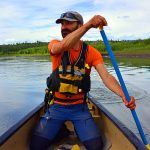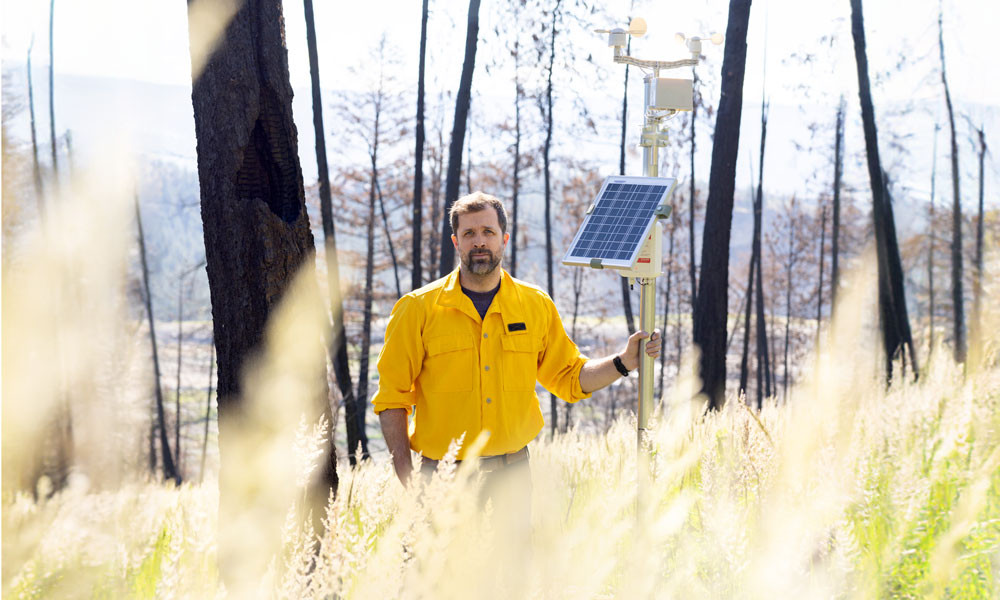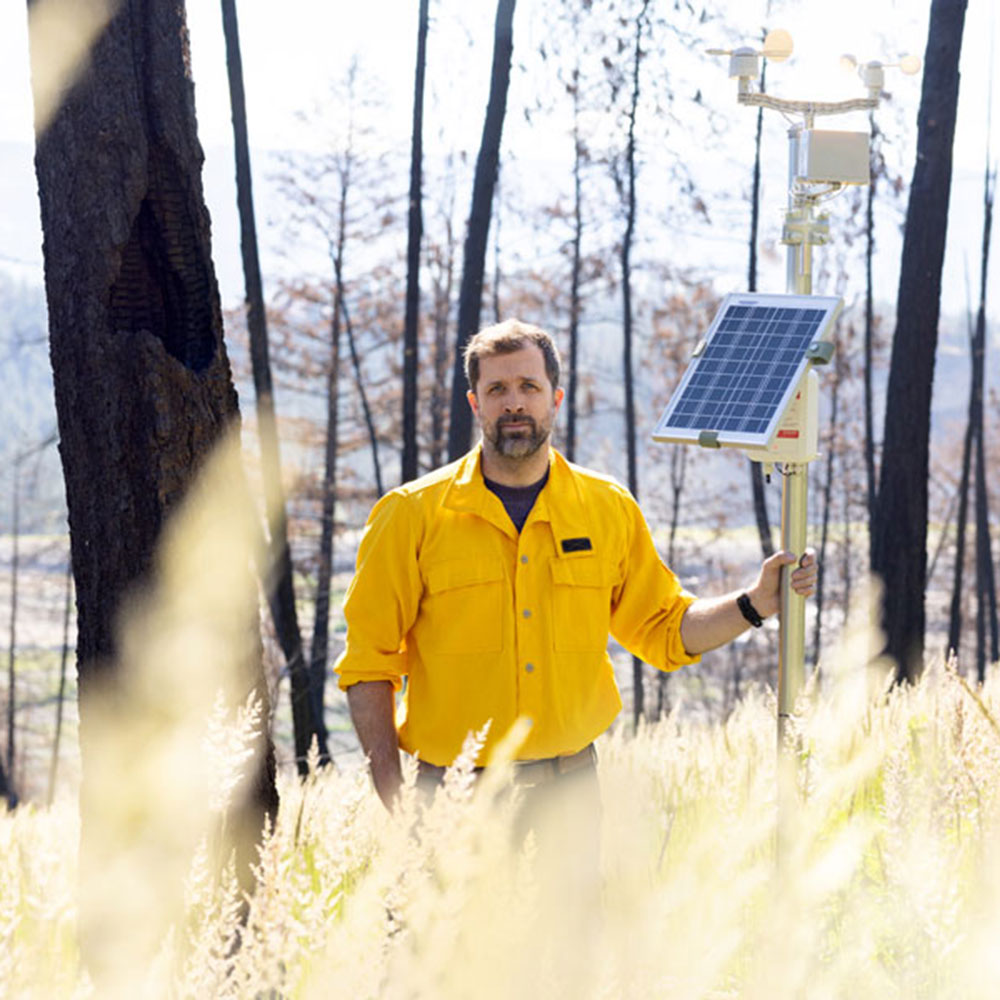Master of Science (MSc), Doctor of Philosophy (PhD)
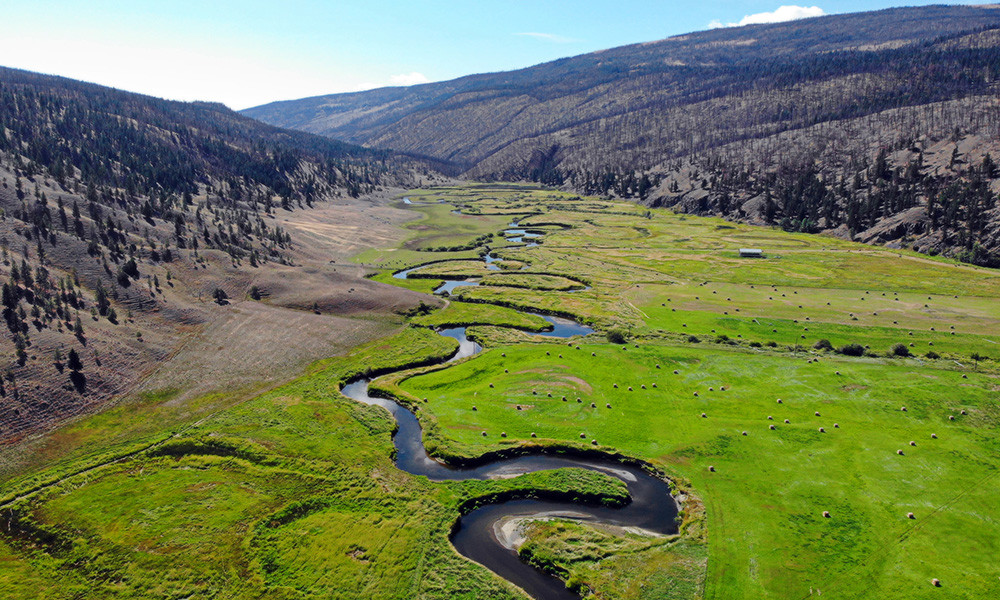
Irving K. Barber Faculty of Science
| Program | Components | Length |
|---|---|---|
| Master of Science (MSc) | Coursework and thesis | 24 months |
| Doctor of Philosophy (PhD) | Dissertation | 48 months |
Why study the Program at UBC Okanagan?
The earth and environmental sciences graduate program offers high-calibre research-based degrees to inquisitive and highly motivated students in a collegial, close-knit campus setting that is welcoming and stimulating.
Students conduct research with faculty and peers on a variety of issues and research projects, many in collaboration with partners in government, non-profit agencies or industry. Our collective aspiration is to generate new knowledge and understanding that is regionally relevant and of global impact.
Both the MSc and PhD degrees provide students with theoretical, practical and analytical expertise, as well as experience in the application of scientific results to real-world problems.
Students enrolled in the MSc program will learn useful skills and methods as well as undertake practical research on real-world problems in earth and environmental sciences. Graduates of the program are prepared for employment opportunities in government, management, industry, education, and consulting or for PhD research.
PROGRAM MILESTONES
- establishing a faculty supervisory committee
- preparing, presenting, and defending a thesis research proposal
- completing coursework
- researching, writing, and defending a thesis
- ideally, publishing research results
COURSEWORK & THESIS REQUIREMENTS
- minimum of 7 credits of coursework
- 23-credit MSc thesis
Most MSc students become Teaching Assistants for at least one semester in order to gain valuable experience and to learn effective communications strategies.
Exceptional MSc students can transfer to the PhD program after one year if they meet program requirements and are approved by the Graduate Program Coordinating Committee.
The PhD is an advanced research degree that requires original and substantive contributions to the advancement of our understanding of earth and environmental systems. Graduates of the PhD program are prepared for careers that involve conducting independent research and teaching in academia, government and industry.
PROGRAM MILESTONES
- establishing a faculty supervisory committee
- preparing, presenting, and defending a dissertation research proposal
- passing a candidacy examination that demonstrates breadth and depth of knowledge in one’s chosen field and specialization
- undertaking advanced data collection and sophisticated analytical methods
- completing dissertation research and writing, and defending the work
- communicating research results via conference presentations and publications in scientific journals
Most PhD students complete Teaching Assistantships for at least two semesters in order to gain valuable teaching experience and to enhance their communication skills.
coursework
At the PhD level, coursework is required only at the discretion of the student’s supervisory committee, depending on previous course credits from the prior MSc degree as well as the nature of their research objectives.
Research and Supervisors
Research Areas
Graduate students can pursue these and other faculty research and teaching interests:
|
|
Supervisors
Please connect with a faculty supervisor before you start the application process. We look forward to hearing about your research interests and career goals.
Graduate student supervisor
Graduate student supervisor
Graduate student supervisor
Graduate student supervisor
Graduate student supervisor
Graduate student supervisor
Graduate student supervisor
Graduate student supervisor
Graduate student supervisor
Graduate student supervisor
Centres and Institutes
- Centre for Environmental Assessment Research (CEAR)
- Complex Environmental Systems Lab
- Fipke Lab for Trace Element Research (FiLTER)
- Okanagan Institute for Biodiversity, Resilience and Ecosystem Services (BRAES)
- PALEO Lab
- Structural Geology and Tectonics Group
Learn more about research in the Department of Earth, Environmental and Geographic Sciences and find descriptions of the the centres, institutes and labs that form the foundation of our research efforts.
Students and Alumni
Meet our students
See what our students are up to—find them in our Contact page for their research interests, supervisors, alma maters and info.
Connect with your peers
The Earth and Environmental Sciences Graduate Society is a student union dedicated to connecting students with each other, the university and the community in order to enhance students’ research, learning and overall experience at UBC Okanagan.
Theses and Dissertations
Find all UBC Okanagan student publications on the University’s digital repository for research and teaching materials.
EXPLORE STUDENT PUBLICATIONS
Tuition and Funding
Tuition
Tuition amounts presented here are estimates only and all fees are subject to change. For official tuition and fee information, visit the UBC Okanagan Academic Calendar, a comprehensive guide to all programs, courses, services and academic policies at the University of British Columbia.
| Program | Schedule | Domestic (per year) | International (per year) |
|---|---|---|---|
| MSc | Full-time | $4,995.78 | $8,776.74 |
| MSc | Part-time | $2,855.22 | $5,046.63 |
| PhD | Full-time | $4,995.78 | $8,776.74 |
Tuition is paid three times a year, on the first day of each term: Winter Term 1 (September), Winter Term 2 (January), and Summer Term (May).
Funding Opportunities
Graduate student stipends are funded through a combination of internal and external funding awards, Teaching Assistantships, and Research Assistantships.
Although funding and stipend amounts are not guaranteed, the earth and environmental sciences graduate program has a number of assistantships available for qualified students. Talk to your potential supervisor about funding opportunities.
Students are expected whenever possible to apply for relevant scholarships and fellowships, including Canadian Tri-Council scholarships and other University Awards.
If students wish to hold off-campus (external) employment, they should discuss with their supervisor, particularly if the student is a grant-holder, as restrictions on hours of work may apply.
GRADUATE ENTRANCE AWARD
The Irving K. Barber Faculty of Science offers a $15,000 merit-based entrance scholarship to three exceptional individuals entering their first year of thesis-based graduate studies under a supervisor from the Irving K. Barber Faculty of Science, or an Interdisciplinary Graduate Studies program with a supervisor who is a member of the Irving K. Barber Faculty of Science.
All applicants to Irving K. Barber Faculty of Science graduate programs who have submitted an application by January 31 will be automatically considered for the award. No additional application is required. Successful applicants will be notified by March 15.
Assistantships
The Department of Earth and Environmental Sciences has funding opportunities and assistantships available for qualified students.
| Program | Recommended funding | Duration |
| MSc | $22,000 per year | 2 years |
| PhD | $26,000 per year | 4 years |
TEACHING ASSISTANTSHIPS (TA)
Paid TA positions are provided through the department and allow graduate students to develop skills in teaching, supervision, facilitation, and student assessment. Teaching assistants may lead seminars, help teach undergraduate courses, or assist in student evaluations and marking.
- MA students are eligible for paid TA positions for up to two years.
- PhD students are eligible for paid TA positions for up to four years.
- TA positions usually occur September to April. TA hours and wages are governed by the British Columbia Government Employees Union (BCGEU).
Teaching assistants are mentored by their supervisor and via the Centre for Teaching and Learning. To learn more or apply for a position, see our Careers page.
Research Assistantships (RA)
As paid research assistants, graduate students assist their supervisor or other researchers in conducting high-level research. RAs are typically funded by a supervisor’s external grants, contracts or other sources of funding, and, therefore, are not guaranteed.
Research Assistantships are wholly dependent upon individual research supervisor’s funding. RA positions may take place at any time during the school year and wages and hours will vary. RA positions are not guaranteed. Talk to your potential supervisor about RA opportunities.
Scholarships & Awards
UBC Awards
The College of Graduate Studies administers merit-based graduate awards at the Okanagan campus. The College manages a number of award competitions each year and administers payment of all internal awards and selected external awards.
External Awards
All prospective graduate students (Domestic and International) should explore and apply for external awards and fellowships, including awards offered by Canada’s three research councils: CIHR, NSERC and SSHRC.
Graduate scholarships and awards may also be available from foundations, private organizations or foreign governments (check with your country’s education authority).
Global and Close-Knit
At UBC Okanagan, you gain all the benefits of attending a globally ranked, top 5% university while studying in a close-knit learning community. 50% of graduates, from all across the globe, choose to stay in the region.
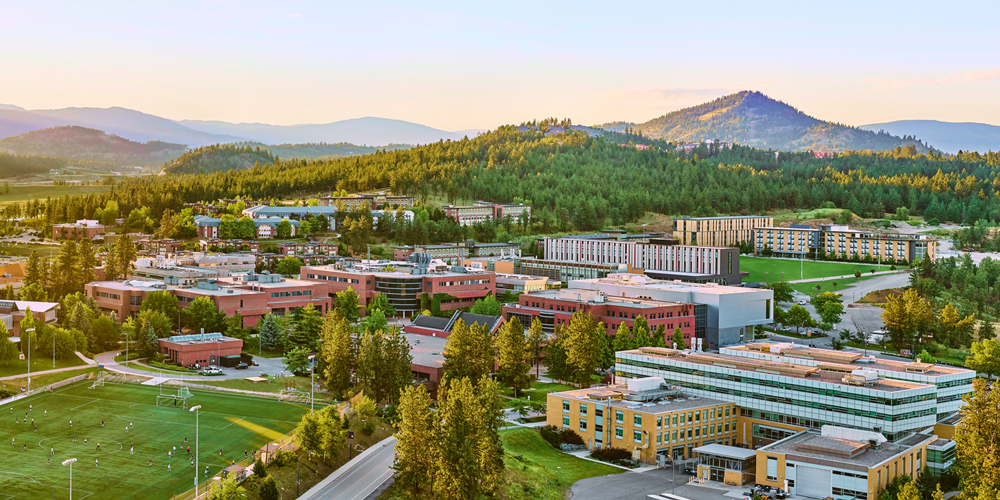
Discover the Okanagan
A diverse natural region with sandy beaches, beautiful farms, vineyards, orchards and snow-capped mountains, the Okanagan is an inspirational landscape perfect for those seeking leisure or outdoor adventure.
UBC's Okanagan campus borders the dynamic city of Kelowna, a hub of economic development with a population of more than 150,000 people— the fourth fastest-growing population in Canada.
Program Inquiries |
|
| Dr. Alessandro Ielpi Graduate Program Coordinator eesc.gradprogram@ubc.ca 250.807.8364 |
|





